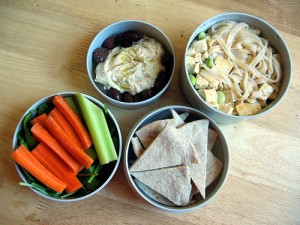“It’s not that we don’t care or understand, it’s that we’re poor.”
Kindly allow me to start this post by thanking you. I am humbled by the letters I am receiving regarding “The Privilege of Prioritizing Organic Food“. Your emails are thoughtful and heartfelt; I am grateful for them, and for the way you have shared my story on Facebook and Twitter. Thank you.
I wrote that post on Thursday and a few of you have left comments, the majority of which were productive and welcome additions to DCentric. One comment, however, stood out. It bothered me enough that I wanted to respond to it, but I kept revising my reply because I am sensitive to the challenges of creating a trusted space for discussing personal or controversial issues (that’s my ultimate goal with this blog), and I don’t want to discourage anyone from sharing their point of view. That is why I’m so glad one of you addressed the questionable comment, instead.
Here’s the comment that I wanted to call out, from “Organic Trade”. After reading it, I wondered if I hadn’t conveyed my point well enough– buying organic may be easier and more affordable than ever, but it’s still beyond the reach of too many people, no matter what their “priorities” are. Also, I don’t understand how choosing organic and thus, more expensive versions of something you buy a lot of is an “easy way to save”:
Thanks to the growth of private label products, farmers’ markets, manufacturers’ coupons, and customer loyalty programs, buying organic is easier and more affordable than ever. One easy way to save is to consider choosing organic versions of the products you buy most. Whether that is milk, produce, or personal care products, buying organic will not only help reduce your exposure to harmful synthetic pesticides and fertilizers, but also support a system of agricultural management that is great for the planet.
For more tips on how to stretch your organic dollars, visit http://www.organicitsworthit.o…. Also check out the Organic Trade Association’s Savvy Organic Shopper blog (http://www.organicitsworthit.o…), which offers price comparisons between organic and conventional products from retail outlets across the U.S. and illustrates that choosing organic is the better bargain.
Organic. It’s worth it.
And here’s how one of you addressed it, poignantly:
I feel like this misses the point. A gallon of organic milk at my local chain store costs 5.99, a gallon of standard milk costs 2.97. That’s over twice as much for organic. Given that our family goes through at least 5 gallons a month, that’s 15.10 I could be buying new socks without holes with. And don’t get me started on the price difference between organic socks and Hanes. Or for that amount of money I could not buy my son his medication every month, with health insurance.
This attitude is precisely what is being talked about. If you can barely afford to buy the necessary things for your family as is, that 3 dollars is huge and really adds up. A large section of this country is really disadvantaged financially and telling them to spend more money they don’t have to begin with is cruel. You don’t think we’d all like to buy the very best for our families? It’s not that we don’t care or understand, it’s that we’re poor.
Well, said. In an email I received today, one of you mentioned that “We need to move beyond the idea that it’s about personal choice (priorities) and toward an understanding that the whole food system – and the policies that uphold it – need to change.”
If a family isn’t consuming organic food, it is probably not because they are ignorant or worse, indifferent to how such choices will impact their loved ones. Many people cannot afford organic food, no matter what– and that is not a personal choice, it’s reality.
-
http://avirilenagalingam.blogspot.com/ nandalal rasiah








